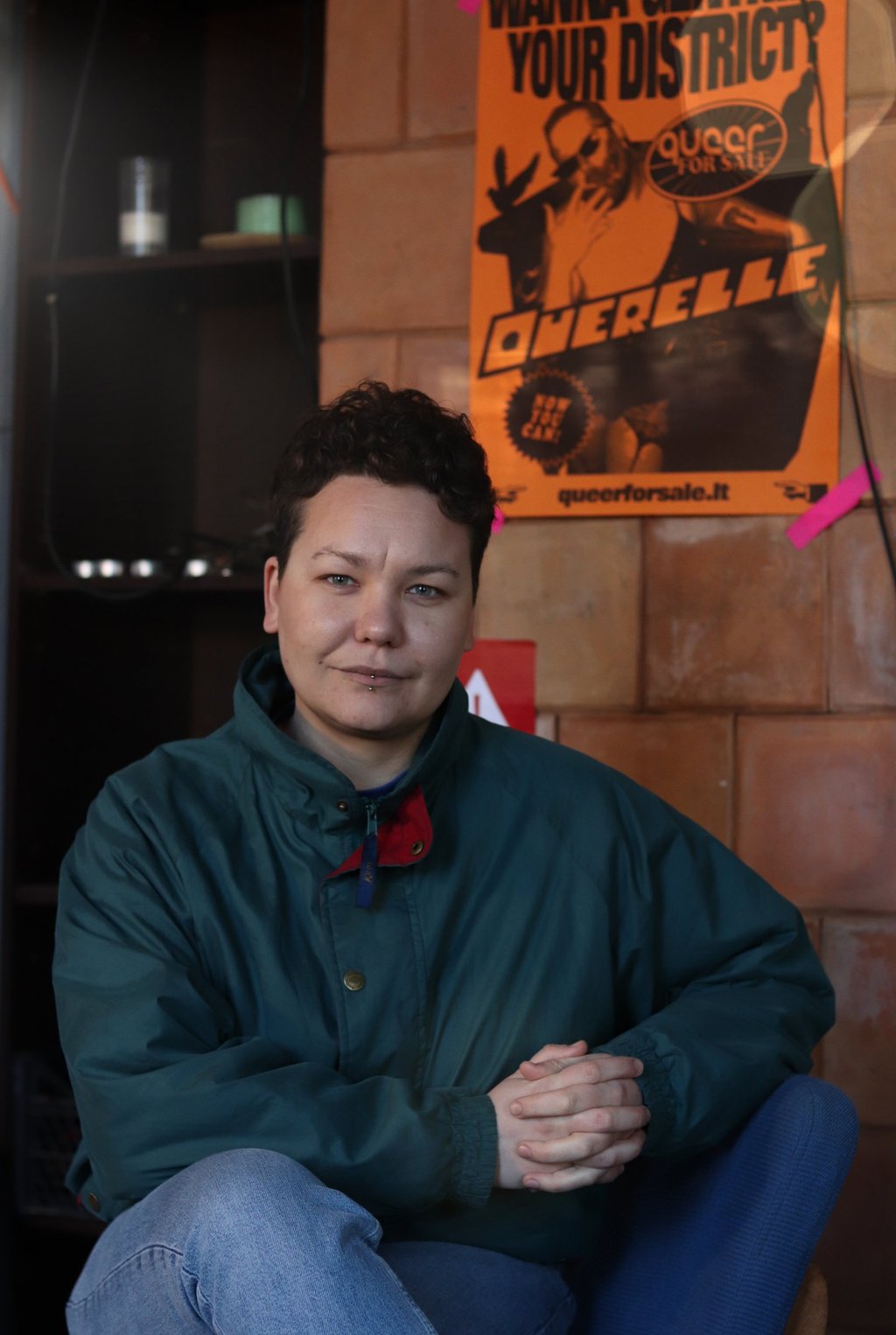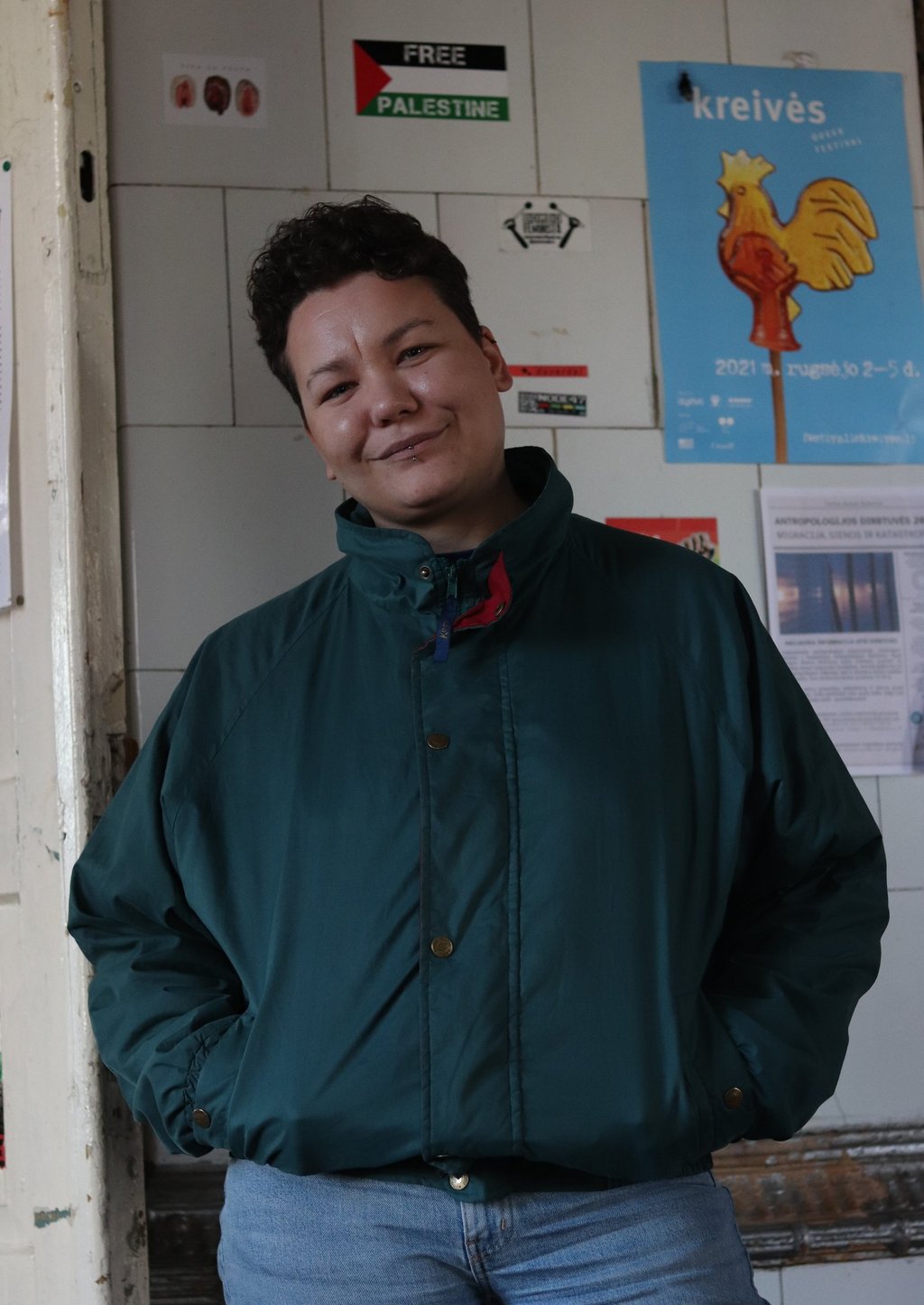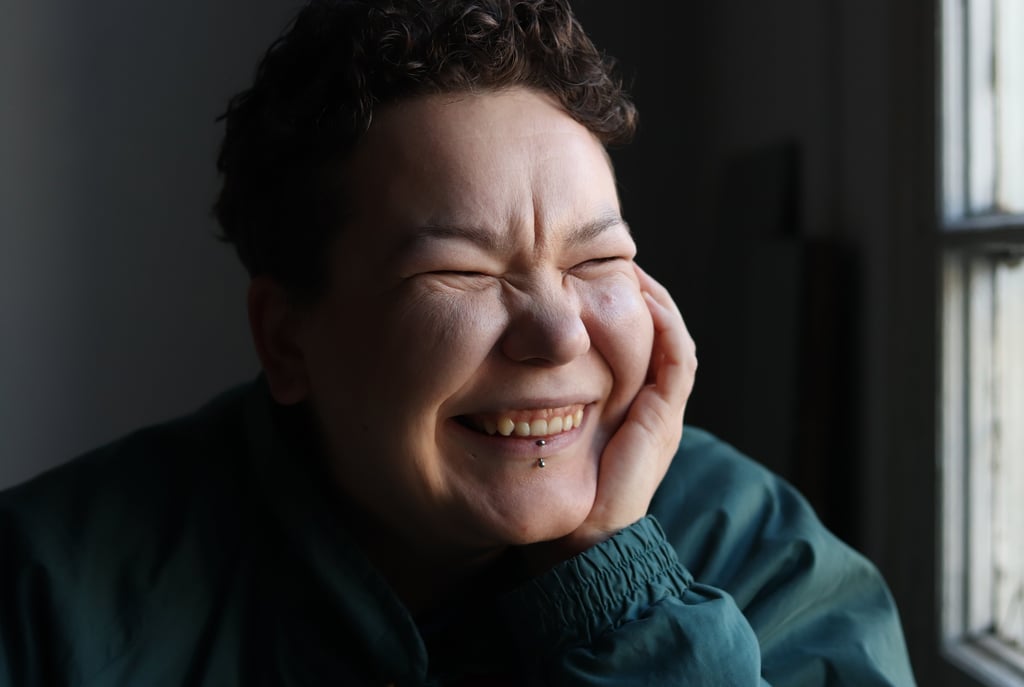Portraits of Members: Viktorija, G1PS Internal Communication Specialist
G1PS internal communications specialist Viktorija on the origins of the union, her first job that ended up in court, and banned phrases at work
ENGLISH
4/4/20249 min read


It's probably easiest to describe myself in terms of activities: I'm finishing the renovation of my house (such a big, long project), I'm a member of the G1PS Council and also the Communications Specialistof the union, and a member of the GPB.lt editorial board. I've recently started a new job at the Center for Equality Advancement (LGPC) as a communications manager. I'm also a member of the team of the association "išgirsti", I'm the coordinator of the Lithuanian Queer Archive, and I'm part of the team of the queer festival "Kreivės".
My undergraduate degree was at Vytautas Magnus University, where I graduated in History with a minor in Philosophy. Later, I did my MA at the Central European University in Budapest and Vienna, studying European Women's and Gender History. Academically, I should consider myself a historian with a specialisation in women's and gender issues, but I don't do any formal research, so I don't describe myself as a historian.
Now I can say that I've managed to find a job that suits my speciality. After many years and many attempts, my work with the association "išgirsti" and my new job at the LGPC seem to me to be directly related to my studies and interests.
Recently, I remembered what I used to want to do when I grew up. I had to write a farewell letter to myself in the 12th grade and we were supposed to meet in the class reunion in 5 years to see if anything had come true. I wanted to be a journalist and I hoped that after 5 years I would have published at least one article. So I guess I tried all sorts of jobs, but the wheel has turned and that early wish has come true - I am now working as a communications specialist, which is quite close to journalism. I didn't go into journalism because I wanted to specialise first and have more content for communication itself or for some kind of analytical article. It may not be a straight line to the goal, a bit of a detour, but I am on my way, I think.
I've had some harsh work experiences (it would be interesting to meet someone who hasn't). I started working as a student, maybe in my second year, and my first work experience actually ended up in a courtroom.
I worked in service, as a waitress-cashier. It was a fast-food restaurant, a sushi bar, and they used to recruit people who had no experience, apparently, because that was a plus for them.
I was 19 years old. I signed an employment contract where it said I was working quarter-time, when in reality I was working full-time. So I got a bit over a hundred litas (Lithuanian currency before euros) on my card and all the rest in cash. All the employees there received part of the money in so-called black money. We would sit down with the employer, I would bring my work schedule, he would bring his, we would check the hours, and he would deduct the cash and hand it to me and put it under the table. The walls of the restaurant were glass windows where you could see everything, so for me it's more of a pose thing, because we can go somewhere and hand over the money. It seems to me that it's a matter of intimidation, you know, we're both dirty, because we're doing it in secret.
Also, we didn't cash in most of the products to the cash register, only drinks and orders paid by card were subject to VAT. In other words, it was a completely shady business, but we were expected to do lots of things: we couldn't eat on the job, so we had to bring our own food for lunch breaks. Even though we worked 12 hours a day, we couldn't get lunch from our employer.
I remember one time I was late for work and I was so badly yelled at, screamed at, that I came in crying, there was so much pressure, they used to watch the cameras every day. It didn't matter whether it was weekends or not, they wouldn't even let us sit down, even though there were no customers.
I tried to organise my colleagues somehow and say that this is illegal. I started to look into it myself and realised that if, for example, the tax inspection came to check and I failed to provide the cheques, the responsibility would fall on my shoulders. Also, there were different rates for workers. So some people were getting more, some people were getting less, and I started to ask those questions. I mean, there was a wage of 50 litas a day for 12 hours, and really, it was a factory of exploitation of young people. Eventually I left, but at the same time I started sending anonymous letters to the Tax Inspectorate to check that workplace.
The inspectorate sent letters to former employees and invited them to talk. They all refused to tell the truth, but I remember I went there and they said: "look, we know you are telling the truth, can you find one more person to testify to this?"
I had a good relationship with my colleagues. I called one of the cooks and she also testified the same thing and then the strategic case was opened. I remember other colleagues were very angry with me, so there was no unity on this issue.
Then I got a subpoena to testify. My employer was also there and he slandered me. The judge gave the decision that she should have given - the right one. They were punished and then, as far as I know, he was also prosecuted for tax evasion, because the first case was about poor work scheduling.
It was very scary. I used to be scared to go home, because I had to go through a dark alley. I was really afraid that I would be caught in there and beaten up. But that was how I started my working career.
Later I worked in London, in the kitchen. I was very surprised to find that they pay everything properly there. Then I worked in a café again, and after a while my employer decided that 10% of the tips should be taken from the staff and that the money should be invested in the inventory of the restaurant, which means that we have to buy our own tables there. We started expressing our dissatisfaction, and during one meeting I even uttered a phrase that is forbidden at work - 'labour code'. And from then on, I was psychologically pressured to leave.
They started demanding that I retrospectively sign some kind of accusation that I was drunk, that I was late for work, when I was not, and I was not even checked. They wanted to collect 3 warnings so that they could dismiss me without severance pay. A year and a half later, the pressure got to me and I gave in. At that time I didn't even know anything about trade unions, I didn't know where to go. It was also such a devastating experience.
I think it is difficult for this sector to really change, it is very dynamic, people change quickly, they come to work on a temporary basis. It is particularly suitable for young people who are not yet thinking about saving for their retirement, or who are in good health and are not concerned about sick leave. It is more attractive for them to have some cash in their pockets all the time, and it is also attractive for employers.
This sector also employs migrants, who have much less opportunity to become familiar with labour law. Keeping a job is very important to them, and their residence permit often depends on it. This exposes vulnerable people in the sector, making them easy to be exploited and intimidated, because you cannot simply survive without a job.
Before G1PS, I was active in the social centre "Emma", and I was involved in all stages of "Gyvenimas per brangus", from the social movement to becoming a news portal. I also took part in the so-called occupations in front of Kaunas City Hall and later on the steps of the state government. This was an attempt to resist the introduction of a liberalised labour code. "Gyvenimas per brangus" is the group of people who initiated those actions and wanted to draw greater public attention to the changes introduced to the Labour Code. The Labour Code was pushed through rather quietly, and we wanted not only to react, but to act consistently and productively. Some victories were won, such as the removal of zero-hours contract from the Labour Code.
This was followed by the solidarity network, an informal initiative that helped people facing labour law violations with all kinds of actions and public attention. But eventually we realised that such an ephemeral and vague structure had its downside. Although we wanted to remain informal at the beginning, the legal status, for example, allows us to have a different relationship with the employer or to represent workers in labour disputes. After much deliberation, we decided to set up a formal organisation.
So, this year will be the sixth anniversary of the founding of the May 1st trade union. My name can be found on the list of founders and it was the first official organisation of the social movements I was part of.
With a break of one term, I have been on the G1PS Council all the time, and I have been responsible for the curation of the newsletters. I was also an active organiser of the March 8 march, and on behalf of G1PS I was active in organising Kaunas Pride.
Since September, I have been a G1PS employee, working as an internal communications specialist. My task is to maintain communication between the members of the union, to provide them with information, to carry out communication between the different departments, to cooperate with the external communication specialist, to refer the members to specialists: labour law consultants, the lawyer, the organiser. In other words, I am like a secretary. I prepare the monthly newsletter, where I inform all the members about the activities of the union in the previous month.
And I can carry out some projects that I initiate myself. Recently, together with the Council, we have adopted internal code of conduct. These contain information on different types of violence and links to where you can go if you experience it. As an organisation grows, tensions can arise between different departments. People work in the same place or are acquaintances, and so we wanted to be clear about what the role of the union is in topics that are not necessarily related to labour law but touch on interpersonal relationships.
This is probably my own interest coming from a general need for justice in the context of social justice, because I can't separate human rights from the broader context of inequality. People spend a great deal of time at work, and the better the working conditions, the more time they will have to engage in other social activities. It seems to me that this social justice has to take place in all spheres of life.
It seems that the rehabilitation of trade unions in Lithuania has not yet happened. There is a historical aspect that trade unions are still associated with the Soviet era, when they were dependent on the government. In an independent country, trade unions are independent organisations. In countries with stronger democracies, trade union membership is compulsory in order to receive certain benefits. In some countries, trade unions even replace employment services.
Plus, employers' representatives and all kinds of free market institutes have a lot of resources and a louder voice. There is also the individual aspect - we are convinced that our future depends on us alone and that we have to slave away to achieve something ourselves. Structural barriers that prevent everyone from having the same success are ignored.
What is G1PS like? It is the youngest union, focusing on sectors that are not represented by the existing trade unions, bringing together people who are not from any single trade but welcoming everyone, which is what is most distinctive about it. We are active not only in labour law issues and in workers' lives, where we provide some infrastructure to organise on their own, but also in pushing forward our own and other trade unions' policy-making. We speak up for human rights, something that other trade unions sometimes lack, especially when it comes to migrants (and not only white people).
There are plans and focus groups that work in the legislative field. For example, the Courier Association has participated in meetings at both national and European level. We advise the labour inspectorate, make proposals to politicians and work on the issue of strike liberalisation.I will let myself daydream for a moment. I want to believe that G1PS will become a bigger, broader, more popular trade union, where members feel confident, safe and active in talking about the benefits of trade unions in their workplaces, inviting to join, and somehow proud to be members of a trade union. I would like to see a future where it is a shame not to be a member of a trade union, and a shame not to fight for your rights, to fight for better conditions for all people.





